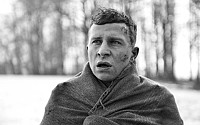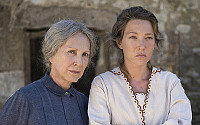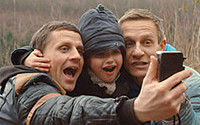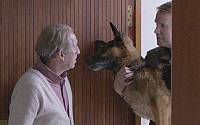| SHADOWS ON THE WALL | REVIEWS | NEWS | FESTIVAL | AWARDS | Q&A | ABOUT | TALKBACK | ||||||||||||||||||||||
 Shadows off the beaten path Shadows off the beaten path | ||||||||||||||||||||||
| Indies, foreigns, docs, revivals and shorts... | ||||||||||||||||||||||
|
On this page:
THE CAPTAIN |
THE GUARDIANS PATHS | UNDER THE TREE < < F O R E I G N > > last update 11.Aug.18 See also: SHADOWS FILM FESTIVAL | ||||||||||||||||||||||
 R E V I E W B Y R I C H C L I N E
R E V I E W B Y R I C H C L I N E | ||||||||||||||||||||||
The Captain Der Hauptmann Der Hauptmann
| ||||||||||||||||||||||
|
dir-scr Robert Schwentke prd Frieder Schlaich with Max Hubacher, Milan Peschel, Frederick Lau, Bernd Holscher, Waldemar Kobus, Alexander Fehling, Samuel Finzi, Wolfram Koch, Eugenie Anselin, Marko Dyrlich, Sascha Alexander Gersak, Hendrik Arnst  release Ger 15.Mar.18,
release Ger 15.Mar.18, US 27.Jul.18 17/Germany 1h58
|  There's an eerie, almost apocalyptic tone to this drama set in the chaotic German countryside at the end of World War II. Skilfully shot in crisp black and white, the bleak desperation is palpable, and yet filmmaker Robert Schwentke keeps things grounded in reality, adding a sense of irony in the way events unfold. The barbarity is appalling, but will dishing out violence to survive eat away the soul?
There's an eerie, almost apocalyptic tone to this drama set in the chaotic German countryside at the end of World War II. Skilfully shot in crisp black and white, the bleak desperation is palpable, and yet filmmaker Robert Schwentke keeps things grounded in reality, adding a sense of irony in the way events unfold. The barbarity is appalling, but will dishing out violence to survive eat away the soul?
Two weeks before the end of the war in April 1945, Willi (Hubacher) has deserted and is running for his life. When he stumbles across the uniform of a captain, he adopts the officer's identity. The first person he meets is Freytag (Peschel), who has lost his unit. Enjoying the role, Willi adopts Freytag as his driver. And as they encounter odd situations along the road, he confidently assumes command, collecting soldiers and meeting other officers on his way to a prison camp, where he jostles for control of the inmates' fate. The story is infused with bone-dry humour, as Willi issues a wide range of orders, from the surreal to the horrific. In each encounter, there's a moment when he has to get into character and think about how he will play the situation, sometimes accompanied by a witty cinematic glimpse inside his mind. At each point along the road, Willi gets thrust into another moral dilemma. And as he gains increasing authority, he begins acting with the callousness everyone expects. Hubacher is terrific in the central role, which requires him to be isolated much of the time, working out what he'll do next, often surrounded by trigger-happy men with nothing to lose. But his bluster isn't questioned too deeply, even when it plays across his face as concealing his true feelings gets increasingly difficult. So he pushes his humanity down deeper. Standout support comes from Peschel's worried cohort, Holscher's prison officer, and especially Lau and Junker as men with doubts about Willi's story. It's fascinating to watch Willi play power games with the various officers he meets, subverting authority and dishing out his own vicious justice. The question is where he is drawing the line. Just as guilty as the condemned prisoners, Willi is ordering death sentences to save his own skin. This leads to a number of darkly harrowing sequences punctuated with Kafkaesque absurdity. The climax is heart-stopping, followed by an increasingly chilling conclusion that reflects outrageously twisted morality, which feels uncomfortably familiar today. The final credits sequence is genius. | |||||||||||||||||||||
|
15 themes, language, violence 8.Aug.18
| | |||||||||||||||||||||
 R E V I E W B Y R I C H C L I N E
R E V I E W B Y R I C H C L I N E | ||||||||||||||||||||||
The Guardians
 Les Gardiennes Les Gardiennes
| ||||||||||||||||||||||
|
dir Xavier Beauvois prd Sylvie Pialat, Benoit Quainon scr Xavier Beauvois, Marie-Julie Maille, Frederique Moreau with Nathalie Baye, Laura Smet, Iris Bry, Cyril Descours, Gilbert Bonneau, Olivier Rabourdin, Nicolas Giraud, Mathilde Viseux, Yann Bean, Xavier Maly, Marie-Julie Maille, Madeleine Beauvois  release Fr 6.Dec.17,
release Fr 6.Dec.17, US 4.Apr.18, UK 17.Aug.18 17/France 2h18 
|  Skilfully written, directed and played, this Great War drama is complex and engaging, exploring important issues of gender and class. And its themes are remarkably current considering that it's based on a 1924 novel. Filmmaker Xavier Beauvois creates what feels like a timeless classic with its big story, intensely involving characters and French countryside setting.
Skilfully written, directed and played, this Great War drama is complex and engaging, exploring important issues of gender and class. And its themes are remarkably current considering that it's based on a 1924 novel. Filmmaker Xavier Beauvois creates what feels like a timeless classic with its big story, intensely involving characters and French countryside setting.
With brothers Georges and Constant (Descours and Giraud) and brother-in-law Clovis (Rabourdin) at the front, the women must run the family farm. In need of help, matriarch Hortense (Baye) and her daughter Solange (Smet) hire 20-year-old Francine (Bry) as a farmhand, and she becomes part of the family. She also can't help but fall in love with Georges when he's on leave, which is a problem because Hortense wants him to marry local girl Marguerite (Viseux). But the main priority over the next five years is to keep things running until the men come home. Of course, over this timespan, both the men and women are changed fundamentally. The returning soldiers are haunted by the horrors they experienced firsthand, and the women have discovered their strength and independence. How each of them works out these issues is woven into the framework of the plot without ever pushing the point. And Beauvois is careful to keep scenes realistic using plenty of humour and passion, as well as a clever dose of irony. The characters are remarkably complex, often deeply unlikeable as they do rather horrible things, jump to conclusions and sometimes callously dismiss those they love. But all of these feelings are easy to identify with, especially as seen through the pure eyes of the innocent Francine, who is played with knowing touches by Bry. Meanwhile, Baye has the bold, uncompromising role as a loving mother whose loyalties are pushed to the breaking point. And Smet (Baye's real-life daughter) brings subtle textures of her own. With events more than a century in the past, the story reminds us that we've come a long way since then, but aren't nearly as enlightened as we like to think we are. The status of women in this society is depicted in a bracingly earthy way: these women are running everything while their men are off killing each other. Then the men return and immediately resume control, quickly reigniting old rivalries and petty grudges that echo their controlling natures. This is delicately underplayed, but the point is provocative.
15 themes, language, violence, sexuality | 2.Aug.18
|  R E V I E W B Y R I C H C L I N E
R E V I E W B Y R I C H C L I N E
Paths
|  Ein Weg Ein Weg
dir-prd Chris Miera | scr Philipp Osterle, Chris Miera with Mike Hoffmann, Mathis Reinhardt, Tom Bottcher, Cai Cohrs, Eva Horacek, Peer Martiny, Anna Schimrigk, Yvone Doring, Sara Loffler, Sarah Heimann, Ludwig Bundscherer, Verena Weiss  release Ger 11.Jan.18, UK 13.Aug.18 17/Germany 1h47
|  Thoughtful and introspective, this German drama traces a 17-year relationship with warm insight and underlying emotion. The collage-style narrative unfolds in chapters that move back and forth in time from the couple's first meeting at a concert to the present day, when everything is feeling rather stale. First-time filmmaker Chris Miera takes an unusually low-key approach, focussing on whispered conversations and offhanded encounters.
Thoughtful and introspective, this German drama traces a 17-year relationship with warm insight and underlying emotion. The collage-style narrative unfolds in chapters that move back and forth in time from the couple's first meeting at a concert to the present day, when everything is feeling rather stale. First-time filmmaker Chris Miera takes an unusually low-key approach, focussing on whispered conversations and offhanded encounters.
After all these years together, it seems like life is falling apart: first, teen son Max (Bottcher) moves out to go travelling before starting university, then Martin (Reinhardt) has to move for work, leaving Andreas (Hoffmann) alone with his small-town carpentry business. But then when they were together, Martin and Andreas were struggling to regain their romantic spark or the sense of focus that came from raising Andreas' son together after his mother died. Along the way, Martin takes a blow to his confidence when his flower shop closes and finding work proves almost impossible. Most of the film consists of everyday moments like cleaning the house, taking out the rubbish or chatting to loved ones on the phone. The absence of any big plot-based fireworks is notable, as cracks form in the relationship simply due to neglect, exhaustion and distractions. Many scenes explore this growing bitterness, which makes the film sometimes hard to watch. But it's so earthy and honest, and packed with such raw expressions of love, that it gets deeply under the skin. Hoffmann and Reinhardt both sensitively convey the idea that these men still deeply care about each other even as their relationship begins to slowly unravel. In playing this, the actors cleverly maintain the chemistry and physicality over the plot's 17-year span, depicting these men as internalising the problems that cause friction between them. And their connections with Max are strong as well, played with a relaxed authenticity by both Bottcher (as a confident teen) and Cohrs (as a little boy). This is a serious, provocative exploration of why some relationships simply fall apart over time, mainly due to the things that are unspoken rather than the usual movie melodrama. The point is that both of these men are dealing with their own personal issues, and they don't always feel able to share the burden with their partner, even as they don't think they can make it alone. It's a remarkably engaging film, understated and moving, and the ease at which we can identify with these thoughts and feelings is both unsettling and comforting.
15 themes, language | 9.Aug.18
|
|  R E V I E W B Y R I C H C L I N E
R E V I E W B Y R I C H C L I N E
Under the Tree |  Undir Trénu Undir Trénu
dir Hafsteinn Gunnar Sigurdsson | scr Huldar Breidfjord, Hafsteinn Gunnar Sigurdsson prd Grimar Jonsson, Sindri Pall Kjartansson, Thorir Snaer Sigurjonsson with Steinthor Hroar Steinthorsson, Edda Bjorgvinsdottir, Sigurdur Sigurjonsson, Thorsteinn Bachmann, Selma Bjornsdottir, Lara Johanna Jonsdottir, Sigridur Sigurpalsdottir Scheving, Dora Johannsdottir, Bjartur Gudmundsson, Vikingur Kristjansson, Nanna Kristin Magnusdottir, Hjortur Johann Jonsson  release Ice 6.Sep.17, US 6.Jul.18, UK 10.Aug.18 17/Iceland 1h29  TORONTO FILM FEST
|  A strikingly realistic approach adds layers of comedy and intensity to this multi-strand drama about clashes between family members and neighbours. It's a jaggedly involving story, directed with sharp observational skill by Hafsteinn Gunnar Sigurdsson and played to the hilt by believable actors who make their complex characters remarkably easy to identify with, even as things turn seriously nasty.
A strikingly realistic approach adds layers of comedy and intensity to this multi-strand drama about clashes between family members and neighbours. It's a jaggedly involving story, directed with sharp observational skill by Hafsteinn Gunnar Sigurdsson and played to the hilt by believable actors who make their complex characters remarkably easy to identify with, even as things turn seriously nasty.
In summery suburban Reykjavik, Agnes (Jonsdottir) throws her husband Atli (Steinthorsson) out of the house when she catches him watching an old video of himself having sex with his ex Rakel (Johannsdottir). So he moves back in with his parents Inga and Baldvin (Bjorgvinsdottir and Sigurjonsson), whose neighbours Eybjorg and Konrad (Bjornsdottir and Bachmann) are angry about a tree that casts a shadow on their sun deck. And as his parents' feud escalates, Atli is desperately trying get the furious Agnes to let him visit their 5-year-old daughter Asa (Scheving). There are constant wrinkles to the story in the characters' connections and pasts. Inga and Baldvin's older son disappeared years ago without a trace. Eybjorg, Konrad's second younger wife, is trying to have a child. Harsh words are exchanged, but has one tree really led to tyres being slashed, gardens vandalised, security cameras, missing pets and more? And does Atli have lingering feelings for Rakel? If not, why didn't he delete that video? Each actor creates a sympathetic character, even when he or she is doing something horrible. They jump to conclusions and cruelly take out frustrations on those close to them, but the frustration is understandable. Steinthorsson is superb as a gentle guy trying to make things right, while Jonsdottir underscores Agnes' bitterness with compassion. And both couples involved in the tree dispute find surprising subtext in each scene. including a hint that Baldvin was planning to trim the tree before the neighbours complained. Filmmaker Sigurdsson plays heavily on the irony running through the film, hinting that events aren't quite what they seem and certainly won't go as anyone expects them to. In other words, the film's focus is on how people jump to conclusions without all the facts. This may be quite natural, and perhaps logical, but there's always more to any story. Actions fuelled by anger or pain aren't necessarily representative of who you really are. But even if they are, hurting someone is never going to help.
15 themes, language, violence, sexuality | 5.Aug.18 

See also: SHADOWS FILM FESTIVAL © 2018 by Rich Cline, Shadows
on the Wall
| |||||||||